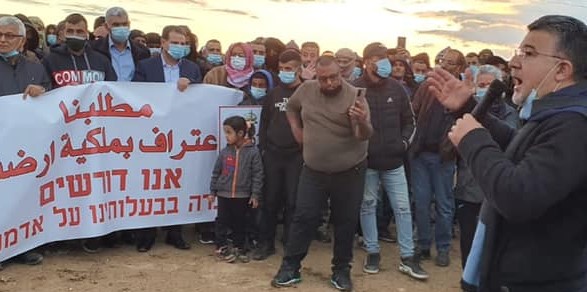A Justice Ministry official told a Knesset committee on Monday, December 7, that Israel’s Nation-State Law is not intended to hurt any of the individual rights of citizens in practice, this after a judge cited the racist law to justify dismissing a lawsuit by Arab residents of the northern city of Carmiel.

Hadash MK Youssef Jabareen (Joint List), right, addresses a protest held in the Negev against land expropriation, November 26, 2020. The white banner reads in Arabic and Hebrew: “Our Demand – Recognition of Our Ownership of Our Lands.” (Photo: Zu Haderech)
Eyal Zandberg, head of Public Law in the Consulting and Legislation Department of the ministry, told the Knesset’s Committee for the Rights of the Child that the law’s wording makes it clear that “it should not diminish the rights of the children.” The state official added that, as the plaintiffs are currently appealing the case, he does not want to go into specifics. However, he stressed that the state was not party to the case in the Krayot Magistrate’s Court in the Western Galilee.
Committee chair, Hadash MK Youssef Jabareen (Joint List) told those present in the committee hearing that the law defining Israel as the nation-state of the Jewish people is “racist” and that it is incumbent “to fight any attempt to translate it into harmful policy.”
The Krayot Magistrate’s Court had cited the controversial nation-state law last week in its decision to dismiss a lawsuit brought by two Arab schoolchildren against the northern town of Carmiel where they reside with their families. The presiding judge, Yaniv Luzon, ruled that the town’s “Jewish character” must be preserved and used this racist trope to justify not providing free transportation to Arab language schools outside of Carmiel for the child plaintiffs.
Although Arabs now constitute around six percent of Carmiel’s population — around 2,760 people — there is still no Arabic-language school inside the city. Consequently, Arab parents are forced to send their children to various schools in the area. Krayot Magistrate’s Court judge Yaniv Luzon wrote in his ruling that providing services to Arabs would change the makeup of Carmiel, which he said was “a Jewish city which is intended to strengthen Jewish settlement in the Galilee. The construction of an Arabic-language school or providing transportation for Arab pupils, wherever and whoever wants it, could change the demographic balance and the character of the city,” he wrote in his decision.
Luzon cited the racist 2018 nation-state law, which enshrines Israel as “the national home of the Jewish people” and says, “The right to exercise national self-determination in the State of Israel is unique to the Jewish people.” It also states, “The state considers advancing Jewish settlement to be a national value, and will act to encourage and advance its establishment.”
“The development of Jewish settlement is therefore a national value, one anchored in a basic law. It ought to be an appropriate and dominant consideration in the array of municipal considerations, including for the issue of establishment schools and funding transportation,” Luzon concluded in his decision to dismiss the suit.
“To everyone who said that the nation-state law was not dangerous and merely symbolic — today’s ruling in Carmiel shows the trend. With rationales of ‘Jewish character’ it is possible to discriminate against Arabs — under the protection of the nation-state law,” said Joint List MK Aida Touma-Sliman (Hadash) on the day of the decision, calling the law one, which “establishes apartheid.
The Jewish Nation-State Law was passed on July 19, 2018. On August 7, 2018, Adalah – The Legal Center for Arab Minority Right in Israel, the Joint List and around a dozen other groups also filed petitions, including top Druze officials, the Association for Civil Rights in Israel (ACRI) to the High Court against the law.
All the petitions contend that the law violates the Basic Law: Human Dignity and Liberty, which is considered the country’s most foundational legal basis for how it views all other issues. Each of the petitions called on the court to be ready to declare the Nation-State Law unconstitutional, despite its status as a Basic Law, which bequeaths it quasi-constitutional status and thus, many would argue, makes it non-annullable by the court. In January 2019, the High Court emphasized the submitted petitions’ constitutional importance when it broadened the panel determining their legal validity from three justices to the maximum of eleven.
However, the High Court then repeatedly granted lengthy extensions for the state to respond to the petitions during the 18-months of elections as well as when the coronavirus crisis initially erupted in the early spring. The first in-person hearing in the High Court in Jerusalem could still take place as scheduled on December 22.
Attorney-General Avichai Mandelblit told the High Court on Thursday, December 3, that the dozen petitioners or so against the nation-state law “had failed to prove their evidentiary burden for the unprecedented request of annulling a Basic Law.” Though Israel has no constitution, its Basic Laws are considered to have quasi-constitutional status. He added that the “law was necessary to give expression to the original vision of Israel as being unique as a Jewish state among a world where Jews are a tiny minority.” Mandelblit also addressed many individual arguments in the petitions and said, “They were dire predictions of discrimination which have not happened and probably will not occur.”
Related: Court Denies Funds to Arab Pupils Based on Racist Nation-State Law


